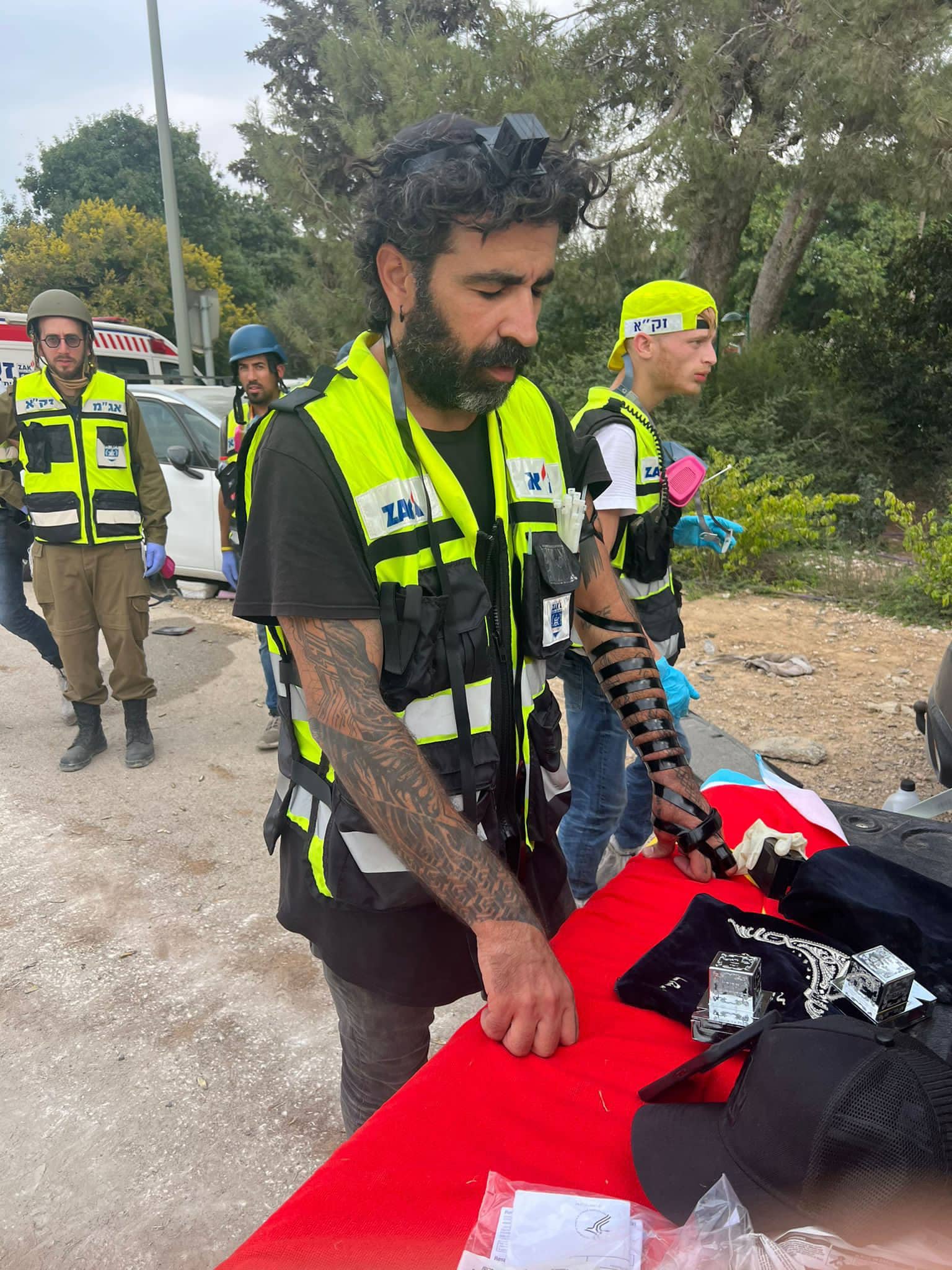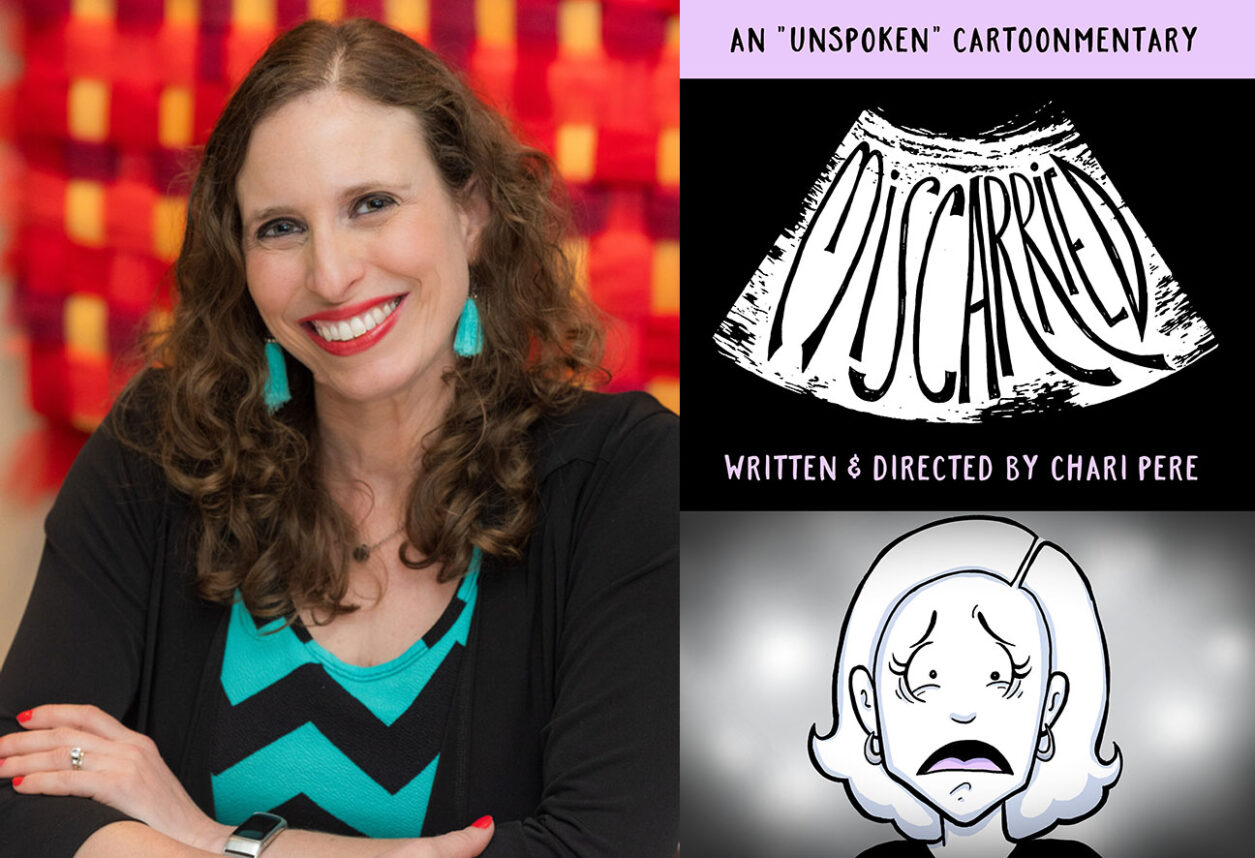 Tomer Peretz reciting a prayer at a massacre site
Tomer Peretz reciting a prayer at a massacre site Tomer Peretz, 41, traveled to Israel with his two young sons to attend a wedding on October 2. Five days later he awoke to the sound of sirens and a new and terrifying reality. The memory of October 7th, 2023 will forever be remembered as the worst terrorist attack in the history of the State of Israel.
Two days after the attack, Peretz volunteered with ZAKA, a volunteer-based organization known for its work in disaster and terrorist attack response. He arrived with them at Kibbutz Be’eri, tasked with the grim mission of collecting the scattered bodies and body parts in the area. The haunting scenes from that day are etched in his mind along with the pungent smells. What he witnessed during that week he recounted in this chilling interview.
Peretz, a professional artist with ties to the fashion industry, told the Jewish Journal how he found himself volunteering with ZAKA; “On Friday, before everything began, I sat with friends from my unit, we shared a meal and exchanged stories. The very next day, my unit was called to action. Despite being diagnosed with PTSD after my military service which exempted me from reserve duty, I couldn’t bear to sit at home and do nothing. So, I called a friend of mine who had been volunteering with ZAKA for 25 years and asked to volunteer. On Monday, I was already in Nahal Oz in Be’eri, working alongside them to collect the bodies.”
ZAKA doesn’t typically recruit volunteers on such a short notice and for such a gruesome task, but Peretz was determined. His commitment made him one of them in no time. “I’ve never done anything like this before, but my friend who volunteers with ZAKA for 25 years, is familiar with my military service and he thought I’d help from outside and not actually go into the field and collect bodies, but that’s what happened. The truth is that I didn’t leave him much choice either.”
By the time Peretz and ZAKA arrived in Be’eri, the bodies had started to rot. It was two days after the massacre and a war field like nothing they had ever experienced before awaited them.
“The first body was that of a woman who was shot in the face until there was nothing left, they just kept shooting even after she was killed. It was Monday morning and by then the bodies were swollen and had worms. They were scattered everywhere, in and outside the homes, some of them had limbs, fingers, feet, hands amputated, or an eye taken out. It was clear that they had been severely tortured before being shot or burned alive. I saw a mother hugging her little boy in an attempt to protect him and they were both burned, there was a couple who were burned together but the man’s body was not completely burned and you could still see the severe whipping on his back. I saw a baby with an axe in his head. In general, there were a lot of babies with decapitated heads. ZAKA volunteers who are used to collecting bodies after terror attacks and disasters went aside to vomit, some fainted. The friend, the team leader of the international delegation, brought me there. He has been to disaster scenes like Turkey and Haiti said he had never seen anything like this before. Hamas’ cruelty shocked us all. In one of the mamads (Israeli secured shelters) we found a 50-year-old man. He killed 15 terrorists and after he was eventually caught, they amputated all his fingers, he somehow managed to escape to the safe room, where he died of smoke inhalation after they burned the place. We found the bodies of the terrorists he killed in the area.”
ZAKA meticulously places each body within a bag, carefully noting the corresponding house number and the specific injuries observed, such as a missing hand, right leg, or an eye. Subsequently, the team searches the immediate area for any severed organs, which are then appropriately bagged. “One of the most distressing moments I witnessed involved burned bodies,” said Peretz. “At one point, I was handed a small bag containing the remains of a young child. I didn’t inquire about its contents; I was simply stunned. As I carried the bag toward the truck, someone told me that it held the charred remains of a little boy. It was an incredibly difficult moment, and we both struggled to hold back our emotions. Every passing second, you find yourself stepping aside, overwhelmed with grief, and tears flow freely. We recited a prayer, the Kaddish with a rabbi while encircling the bodies wrapped in plastic bags.”
Each day, Tomer and the crew of volunteers returned home for a few hours’ sleep before they were scheduled to come back and continue their work. The first night, they just sat and talked until 3am. During that first week, none of them were able to sleep well, the devastating images of entire families tortured and burnt alive too hard to comprehend. In one home the volunteers found a family of four tied up, all dead. The father was missing an eye, the little boy’s fingers were all cut, the little girls’ feet amputated, her mother was missing one breast. While the family was lying there bleeding and in sheer agony, the terrorists were sitting at the dining table eating. The thoughts of what the victims experienced during their last hours on earth don’t let go of anyone who had witnessed the horrors firsthand.
“Actually, my nights have become harder now,” admitted Peretz, “When you’re in the midst of a war, your mind is constantly occupied with the tasks at hand. However, now that I’m back here in Los Angeles, my mind has more room to reflect, and it’s difficult to grapple with the situation from a distance. There’s a strong urge to be there and continue helping but I have a wife and three children who need me.”
Perez has lived in Los Angeles for 18 years and is the father of three children, aged 5, 9 and 11. His decision to volunteer was a source of concern for his family, particularly his parents, who were understandably worried. Initially his wife had difficulty accepting his choice, but she soon began to offer her support.
From the moment Peretz arrived in Be’eri and later at the Nova festival area, he never ceased his efforts to document the atrocities. His goal was to ensure that the world had an opportunity to witness and comprehend the gravity of the situation. Most Zaka volunteers primarily consist of ultra-Orthodox men, using “kosher” phones that lack cameras, they found it perplexing that the new volunteer was consistently recording.
“One of them said to me, ‘You’re recording too much,’” Perez said. “I responded, ‘The world needs to witness this.’ Their mindset leaned more toward safeguarding families. These are deeply spiritual individuals who view their work as a sacred duty, a great Mitzvah. They don’t prioritize social networks. Coming from a different background I understood the vital importance of these images and videos for the world to gain insight into what occurred here.”
Peretz is acutely aware that, despite the extensive documentation, there are still individuals who deny the events in Israel, much like Holocaust deniers. He clarified that he doesn’t attempt to persuade these deniers but rather focuses on engaging with those who are genuinely interested in understanding and learning.
“I often encounter those deniers on social media. However, I don’t invest my time and energy in debating them,” Peretz explained. “My preference is to educate those who are unaware of the truth and are genuinely seeking to learn. Engaging with deniers is often futile because they will invariably find something to dispute. Whether I present evidence like the bag containing the charred remains of a child or even the child’s body itself, they will assert its doctored or manipulated. Regardless of the proof offered, deniers tend to adhere to their biases, disliking Jews and disregarding the facts. This pattern of denial and hatred is nothing new for us Israelis.”
During these operations, rocket attacks continued in the area, forcing the volunteers to find shelter behind some vehicles. In order to deal with everything he had witnessed, Peretz said he receives a partial treatment. “Every other day I speak with someone. ZAKA has now included me in a support group that has a psychiatrist and a therapist. I recognize the importance of self-care. Additionally, keeping busy has been a saving grace for me. I’m deeply involved in advocacy work, frequently moving from one interview to another. Currently, I’m also working on an art installation scheduled for November 5th. We’ve created a space, complete with a stage and setting, reminiscent of the Nova Festival. The event will host 1700 people, with 1400 simulating the deceased and experiencing horrors, 200 simulating abductees, and 100 simulating the missing.”
A few months ago, Peretz, a gifted painter, was working on a fashion line he named “War Is Over.” He reflected, “I declared then that the war was over, and then all of this happened.”

Peretz characterizes ZAKA’s work as “the dirtiest job in the world.” Yet, it is also a noble mission performed by a group of truly righteous people who are dedicated to ensuring that the deceased receive a proper Jewish burial. This is done not only for their sake but also to provide closure for their grieving families.





















 More news and opinions than at a Shabbat dinner, right in your inbox.
More news and opinions than at a Shabbat dinner, right in your inbox.